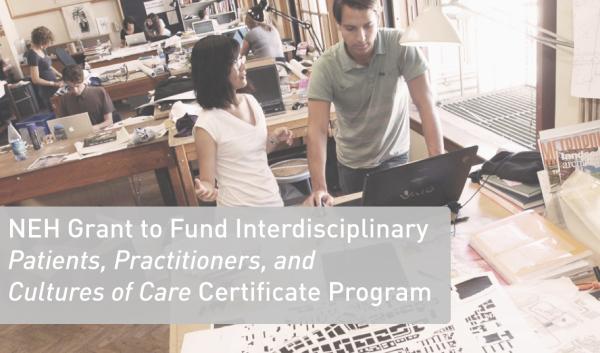UTSOA Receives NEH Grant to Fund New Bridging Disciplines Program

The National Endowment for the Humanities has awarded a $97,491 grant to The University of Texas at Austin School of Architecture and its partners across the UT Austin campus to fund the development of a new Bridging Disciplines Program.
The Bridging Disciplines Programs, part of the School of Undergraduate Studies, provide undergraduate students with the opportunity to earn an interdisciplinary certificate through a course of study that integrates classroom, research, and internship experiences and that represents an area of innovative faculty research, teaching, and collaboration at UT Austin. With support from the grant, the School of Architecture will lead the program Patients, Practitioners, and Cultures of Care, which will focus on cultivating skills that advance a humanistic practice of health care. Faculty in the School of Architecture, College of Liberal Arts, Dell Medical School, Moody College of Communication, School of Nursing, School of Social Work, and the Hogg Foundation for Mental Health will work together and lend expertise to the new program.
“The School of Architecture is uniquely suited to lead the exploration of the relationship between the physical environment and physical and psychological health through this interdisciplinary approach,” states Elizabeth Danze, Interim Dean of the School of Architecture. “We are grateful for the support of the National Endowment for the Humanities, and look forward to working with colleagues across campus to provide students with experiential learning opportunities that will foster a broad, humanistic perspective.”
Designed for students who plan to pursue post-graduate education and careers in the health professions, Patients, Practitioners, and Cultures of Care highlights the central role the humanities can play as students prepare to address the numerous challenges facing healthcare providers today. The concentration is centered on the idea that health care is a shared local, national, and global project that can benefit from multidisciplinary perspectives. Participating students will refine skills such as empathy, ethical sensitivity, self-reflection, historical perspective, cultural awareness, understanding of the social effects of the built environment, and effective communication strategies.
“I believe this program is going to be immensely popular among students, and, even more importantly, it will prepare them to be thought leaders in the medical field,” remarks Brent Iverson, Dean of the School of Undergraduate Studies.
“The Bridging Disciplines Programs are designed to provide students with an interdisciplinary, experiential education on complex topics, and Patients, Practitioners, and Cultures of Care will be a wonderful addition to our offerings for undergraduates,” explains Jeanette Herman, Ph.D., Bridging Disciplines Programs Director and Assistant Dean for Academic Initiatives at the School of Undergraduate Studies. “There is a need for curriculum that will give future health care providers a nuanced understanding of the human elements that shape health care today, and I am thrilled that this grant will enable the development of much-needed new courses and programming in this area.”
Patients, Practitioners, and Cultures of Care is led by Stephen Sonnenberg, MD, who holds joint appointments at the School of Architecture and the College of Liberal Arts, where he is Fellow of the Trice Professorship in the Plan II Honors Program. He is joined by colleagues Phillip Barrish, PhD, Professor in the Department of English; Pauline Strong, PhD, Professor of Anthropology and Women’s and Gender Studies and Director of the Humanities Institute; S. Clairborne Johnston, MD, PhD, Dean of the Dell Medical School; Elizabeth Danze, FAIA, Interim Dean of the School of Architecture; Barbara Jones, PhD, Associate Dean for Health Affairs and Co-Director of the Institute for Collaborative Health Research and Practice at the School of Social Work; Junfeng Jiao, PhD, Assistant Professor and Director of the Urban Information Lab at the School of Architecture; Kamran Ali, PhD, Professor in the Department of Anthropology; Brad Love, PhD, Associate Professor and Associate Director of the Center for Health Communication at the Moody College of Communications; Millie Harrison, MA, of the Moody College of Communications; Farya Phillips, PhD, of the School of Social Work; Octavio Martinez, M.D., Executive Director of the Hogg Foundation for Mental Health; Joy Penticuff, PhD, Distinguished Professor Emerita of the School of Nursing; and remotely by Rita Charon, MD, PhD, Professor at Columbia University Medical Center.
National Endowment for the Humanities
NEH supports research, education, preservation, and public programs in the humanities by funding top-rated competitive, peer-reviewed proposals examined by panels of independent, external reviewers. At an annual cost of about 50 cents per capita, NEH brings high-quality historical and cultural experiences to large and diverse audiences in all 50 states, the District of Columbia, and five territories.
See the NEH's award announcement here.
